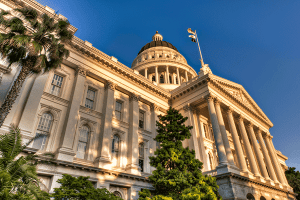 Governor Gavin Newsom laid down his lawmaking pen Friday night after signing 890 new laws into effect, and vetoing another 156, including three California Chamber of Commerce job killer bills.
Governor Gavin Newsom laid down his lawmaking pen Friday night after signing 890 new laws into effect, and vetoing another 156, including three California Chamber of Commerce job killer bills.
The CalChamber tracked more than 700 bills this year, formally opposing more than 100. Most of the legislation the CalChamber opposed was either stopped or amended to address concerns.
Out of 19 job killer bills identified this year, the Legislature sent seven to the Governor, who signed four of those bills into law. At the urging of the CalChamber, the Governor rejected three job killer bills.
In one of labor’s major defeats of the year, the CalChamber led a large coalition to secure a veto of SB 799 (Portantino; D-Burbank), which would have provided unemployment compensation to striking workers. The Governor also vetoed several other onerous labor-supported bills, including SB 627 (Smallwood-Cuevas; D-Los Angeles), setting a stringent recall process for certain employers to return former employees to the workforce; AB 1356 (Haney; D-San Francisco), a WARN Act expansion; and SB 725 (Smallwood-Cuevas; D-Los Angeles), requiring grocery stores to pay mandatory severance. He also vetoed a plaintiff attorney-sponsored bill, AB 524 (Wicks), which would have subjected employers, especially small employers, to litigation.
Below is a sampling of the CalChamber priority bills that were either stopped or signed into law.
Job Killer Bills
The Governor signed the following job killer bills:
- AB 647 (Holden; D-Pasadena) Grocery Workers. Significantly expands statute related to successor grocery employers, including disrupting the ability for independent small stores to join together and creating a significant new private right of action.
- SB 365 (Wiener: D-San Francisco) Undermines Arbitration. Discriminates against use of arbitration agreements by allowing trial courts to continue trial proceedings during any appeal regarding the denial of a motion to compel.
- SB 616 (Gonzalez; D-Long Beach) Costly Sick Leave Expansion on All Employers. Imposes new costs and leave requirements on employers of all sizes, which is in addition to all other enacted leave mandates that small employers throughout the state are already struggling with to implement and comply.
- SBX1 2 (Skinner; D-Berkeley) Windfall Profits Tax. Sets an arbitrary cap on the amount of profit that a refiner operating in the state of California can earn over a quarterly basis. This measure would further diminish supply, discourages operational efficiencies, and would limit the amount of capital a refiner could reinvest into their infrastructure to support California’s long-term climate goals.
The Governor vetoed the following bills:
- AB 524 (Wicks; D-Oakland) Expansion of Litigation Under FEHA. Exposes employers to costly litigation under the Fair Employment and Housing Act by asserting that any adverse employment action was in relation to the employee’s family caregiver status, which is broadly defined to include any employee who provides direct care of any person of their choosing, and creates a de facto accommodation requirement that will burden small businesses.
- SB 627 (Smallwood-Cuevas; D-Los Angeles) Onerous Return to Work Mandate. Imposes an onerous and stringent process to hire employees based on seniority alone for nearly every industry, including hospitals, retail, restaurants and movie theaters, which will delay hiring and eliminates contracts for at-will employment.
- SB 799 (Portantino; D-Burbank) Increased Unemployment Insurance Taxes to Subsidize Striking Workers. SB 799 will allow striking workers to claim UI benefits when they choose to strike. Because the UI Fund is paid for entirely by employers, SB 799 will effectively add more debt onto California employers. Moreover, SB 799 will effectively force employers to subsidize strikes at completely un-related businesses because the UI Fund’s debt adds taxes for all employers, regardless of whether they’ve had a strike.
Oppose Bills
The following CalChamber-opposed bills were vetoed:
- AB 316 (Aguiar-Curry; D-Winters) Vehicles: autonomous vehicles: Codifies an arbitrary date by which heavy duty autonomous vehicles will need to keep a human safety operator within the vehicle and bypasses state’s current regulatory process.
- AB 1213 (Ortega; D-San Leandro) Tolling temporary disability payments. Requires tolling of temporary disability payments if Utilization Review decision is overturned during Independent Medical Review, which will drastically increase the number of unnecessary Independent Medical Review requests and is unnecessary in light of data supporting accuracy of Utilization Review decisions.
- AB 1356 (Haney; D-San Francisco) WARN Act expansion. Significantly expands WARN Act by increasing notice period, changing definition of covered establishment, and expanding applicability to workers under overly broad definition of “employee of a labor contractor.”
- SB 90 (Wiener; D-San Francisco) Increases health care costs. Increases health care costs by capping cost sharing for insulin prescriptions at $35 for 30-day supply.
- SB 725 (Smallwood-Cuevas; D-Los Angeles) Mandatory severance. Unnecessarily requires grocery stores to pay mandatory severance, which should be left to the discretion of the employer.
Water-Related Opposed Bills
The following opposed bills were defeated for the year, but may be brought up again in 2024:
- AB 429 (Bennett; D-Ventura) Groundwater restriction. Adds new regulatory layer to groundwater well permitting processes with unclear triggers for applicability. Increases costs and liability risks associated with well permitting. Failed deadline.
- AB 460 (Bauer-Kahan; D-Orinda) Water rights. Gives State Water Board broad authority to issue interim relief orders for a wide variety of alleged water use violations, with little or no opportunity to be heard. Prevents judicial review of an interim relief order. Failed deadline.
- AB 560 (Bennett; D-Ventura) Groundwater adjudication proceedings. Imposes new requirements for courts to consult with State Water Board prior to entering a final judgment in a groundwater adjudication, raising questions about role of executive in the judiciary. Failed deadline.
- AB 1337 (Wicks; D-Oakland) Water rights. Gives broad authority to State Water Board to curtail water rights of any seniority or claim of right. Allows curtailments to issue without a hearing, depriving water rights holders of due process. Failed deadline.
- AB 1563 (Bennett; D-Ventura) Groundwater restriction. Adds new regulatory layer to groundwater well permitting processes. Increases costs and liability risks associated with well permitting. Failed deadline.
- SB 687 (Eggman; D-Stockton) Delta conveyance. Stops progress on the Delta Conveyance Project until Bay-Delta Water Quality Control Plan is updated and fully implemented. Holds infrastructure project to modernize California’s water system hostage until a lengthy planning process is both complete and “fully implemented.” Failed deadline.
Amended Bills
CalChamber opposition to the following proposals were removed after amendments were made to the bills. The Governor signed both bills:
- AB 418 (Gabriel; D-Woodland Hills) Chemical Ban. Prior to amendments striking titanium dioxide from the bill, the bill banned five food chemical additives found to be safe by the federal Food and Drug Administration. Opposition removed after amendments narrowed the scope of chemicals banned.
- SB 567 (Durazo; D-Los Angeles) Hurts Small Rental Property Owners. Originally prohibited owners of rental property from moving into their rentals unless they could show a 51% or greater ownership stake, creating an impossible standard to comply with if the property was owned 50/50 with someone else. Also made it difficult, if not impossible, to repair or sell one’s rental property by placing arbitrary new requirements on small property owners. Opposition removed after amendments eliminated these provisions. Neutral.
Support Bills
The following CalChamber-supported bills have been signed:
- AB 356 (Mathis; R-Porterville) Streamlines housing. Extends the sunset contained in AB 2341 (Mathis) that provides aesthetic impacts are not a CEQA impact for any project involving the refurbishment, conversion, repurposing or replacement of an existing building into housing.
- AB 358 (Addis; D-Morro Bay) Community college districts student housing. Eases construction of student housing by easing compliance with Field Act.
- AB 531 (Irwin; D-Thousand Oaks) The Behavioral Health Infrastructure Bond. Provides $6.38 billion to fund critically needed behavioral health treatment beds and supportive housing through a general obligation bond measure.
- AB 965 (Juan Carrillo; D-Palmdale) Deploys broadband faster. Streamlines deployment of broadband infrastructure and will allow for higher speed internet to be provided to more Californians.
- AB 1217 (Gabriel; D-Woodland Hills) Food and beverage service. Extends existing regulatory modifications that allow neighborhood restaurants to continue to serve the public in expanded, outdoor dining areas.
- AB 1355 (Valencia; D-Anaheim) Electronic notices. Allows workers to request certain employment notices to be delivered electronically rather than in paper, benefiting both workers and the environment.
- AB 1373 (Garcia; D-Coachella) Energy. Streamlines processes to ensure more rapid buildout of certain energy technologies and infrastructure.
- AB 1633 (Ting; D-San Francisco) Expedites Housing. Closes a known CEQA loophole used by some local jurisdictions to block housing projects and helps ensure that legally compliant homes are permitted and built by expanding the definition of “disapproving a project” under the Housing Accountability Act (HAA) to include stalling once the environmental review documents have been completed.
- AB 1756 (Committee on Judiciary) Small employer mediation program. Extends the sunset on the Civil Rights Department small employer mediation program, which allows small employers to mediate certain employment claims under the Government Code.
- SB 326 (Eggman; D-Stockton) The Behavioral Health Services Act. Restructures California’s behavioral health services programs to provide services for substance use disorders and move homeless individuals to shelter for treatment.
- SB 621 (Caballero; D-Salinas) Pharmaceutical Cost Containment. Reduces pharmaceutical costs and premiums for employers by allowing plans and insurers to utilize less expensive but equally as effective biosimilar drugs prior to administering a reference biologic.
- SB 659 (Ashby; D-Sacramento) Groundwater recharge. Requires state to plan for creating new groundwater recharge storage by 2028.


